John Key
| The Right Honourable John Key MP | |
|---|---|
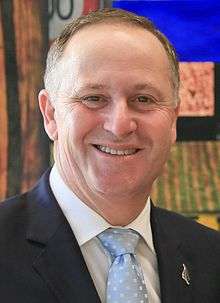 | |
| 38th Prime Minister of New Zealand | |
|
Assumed office 19 November 2008 | |
| Monarch | Elizabeth II |
| Governor General |
Anand Satyanand Jerry Mateparae Patsy Reddy |
| Deputy | Bill English |
| Preceded by | Helen Clark |
| Succeeded by | TBD |
| 31st Leader of the Opposition | |
|
In office 27 November 2006 – 8 November 2008 | |
| Deputy | Bill English |
| Preceded by | Don Brash |
| Succeeded by | Phil Goff |
| 12th Leader of the National Party | |
|
Assumed office 27 November 2006 | |
| Deputy | Bill English |
| Preceded by | Don Brash |
| Succeeded by | TBD |
| Member of the New Zealand Parliament for Helensville | |
|
Assumed office 27 July 2002 | |
| Preceded by | Constituency established |
| Majority | 20,547 (56.49%)[1] |
| Chairman of the International Democrat Union | |
|
Assumed office 21 November 2014 | |
| Deputy | Tony Clement |
| Preceded by | John Howard |
| Personal details | |
| Born |
John Phillip Key 9 August 1961 Auckland, New Zealand |
| Political party | National |
| Spouse(s) | Bronagh Key (1984–present) |
| Children | 2 |
| Alma mater | University of Canterbury |
| Signature |
 |
| Website | Official website |
John Phillip Key (born 9 August 1961) is the 38th Prime Minister of New Zealand, in office since 2008. He led the New Zealand National Party from 2006 and has announced his resignation, effective 12 December 2016.
Overview
Born in Auckland before moving to Christchurch when he was a child, Key attended the University of Canterbury and graduated in 1981 with a bachelor of commerce. He began a career in the foreign exchange market in New Zealand before moving overseas to work for Merrill Lynch, in which he became head of global foreign exchange in 1995, a position he would hold for six years. In 1999 he was appointed a member of the Foreign Exchange Committee of the Federal Reserve Bank of New York until leaving in 2001.
Key entered the New Zealand Parliament representing the Auckland electorate of Helensville as one of the few new National members of parliament in the election of 2002 following National's significant defeat of that year. He has held the seat since then. In 2004, he was appointed Finance Spokesman for National and eventually succeeded Don Brash as the National Party leader in 2006. After two years as Leader of the Opposition, Key led his party to victory at the November 2008 general election, and repeated this feat at both the November 2011 general election and September 2014 general election.
As Prime Minister, Key leads the Fifth National Government of New Zealand which entered government at the beginning of the late-2000s recession in 2008. In his first term, Key's government implemented a GST rise and personal tax cuts. In February 2011, a major earthquake in Christchurch, the nation's second largest city, significantly affected the national economy and the government formed the Canterbury Earthquake Recovery Authority in response. In its second term, Key's government announced a policy of partial privatisation of five state-owned enterprises; while the policy was enacted, voters in a citizens-initiated referendum on the issue were 2 to 1 opposed to the policy. In foreign policy, Key announced the withdrawal of New Zealand Defence Force personnel from their deployment in the war in Afghanistan, signed the Wellington Declaration with the United States and pushed for more nations to join the Trans-Pacific Partnership.
Key announced he will step down from the role of Prime Minister and leader of the National Party effective 12 December 2016.[2]
Personal life
Key was born in Auckland, New Zealand, to George Key (1914–1969)[3] and Ruth Key (née Lazar; 1922–2000),[3] on 9 August 1961. His father was an English immigrant and a veteran of the Spanish Civil War and World War II.[4] Key and his two sisters were raised in a state house in the Christchurch suburb of Bryndwr, by his mother, an Austrian Jewish immigrant.[5][6] Key is the third prime minister or premier of New Zealand to have Jewish ancestry, after Julius Vogel and Francis Bell.[7]
He attended Aorangi School, and then Burnside High School from 1975 to 1979.[8] Then he attended the University of Canterbury and earned a Bachelor of Commerce degree in accounting in 1981.[5][9] He has attended management studies courses at Harvard University.[10]
Key met his wife Bronagh when they were both students at Burnside High School. They married in 1984. She also has a BCom degree, and worked as a personnel consultant before becoming a full-time mother. They have two children, Stephie and Max.[6] Max is the new night-time radio host for George FM, and is also a singer.[11]
On 25 July 2008, Key was added to the New Zealand National Business Review (NBR) Rich List for the first time. The list details the wealthiest New Zealand individuals and family groups. He had an estimated wealth of NZ$50 million,[12] making him the wealthiest New Zealand Member of Parliament.[13]
Before politics
Key's first job was in 1982, as an auditor at McCulloch Menzies, and he then moved to be a project manager at Christchurch-based clothing manufacturer Lane Walker Rudkin for two years.[14] Key began working as a foreign exchange dealer at Elders Finance in Wellington, and rose to the position of head foreign exchange trader two years later,[15] then moved to Auckland-based Bankers Trust in 1988.[5]
In 1995, he joined Merrill Lynch as head of Asian foreign exchange in Singapore. That same year he was promoted to Merrill's global head of foreign exchange, based in London, where he may have earned around US$2.25 million a year including bonuses, which is about NZ$5 million at 2001 exchange rates.[5][16] Some co-workers called him "the smiling assassin" for maintaining his usual cheerfulness while sacking dozens (some say hundreds) of staff after heavy losses from the 1998 Russian financial crisis.[6][16] He was a member of the Foreign Exchange Committee of the New York Federal Reserve Bank from 1999 to 2001.[17]
In 1998, on learning of his interest in pursuing a political career, the National Party president John Slater began working actively to recruit him. Former party leader Jenny Shipley describes him as one of the people she "deliberately sought out and put my head on the line–either privately or publicly–to get them in there".[6][18]
Early political career
Early years in Parliament
| Parliament of New Zealand | ||||
| Years | Term | Electorate | List | Party |
| 2002–2005 | 47th | Helensville | 43 | National |
| 2005–2008 | 48th | Helensville | 7 | National |
| 2008–2011 | 49th | Helensville | 1 | National |
| 2011–2014 | 50th | Helensville | 1 | National |
| 2014–present | 51st | Helensville | 1 | National |
Auckland's population growth, as evidenced in the 2001 census, led to the formation for the 2002 General Election of a new electorate called Helensville, which covered the north-western corner of the Auckland urban area.[19] Key beat long-serving National MP Brian Neeson (whose own Waitakere seat had moved on paper to being a Labour seat through the boundary changes) for the National Party Helensville selection. At the 2002 elections Key won the seat with a majority of 1,705, ahead of Labour's Gary Russell, with Neeson, now standing as an independent, coming third.[20] Key won re-election with ease at the 2005 election garnering 63% of votes cast in Helensville,[21] and increased his majority again in 2008, gaining 73% of the electorate vote.[1]
Finance spokesman
In 2004 the National Party Parliamentary leader Don Brash promoted Key to the Opposition front benches and appointed him the party spokesman for finance. In late 2006 Brash resigned as leader, citing damaging speculation over his future as the reason. His resignation followed controversies over an extramarital affair, and over leaked internal National Party documents later published in the book The Hollow Men.[22]
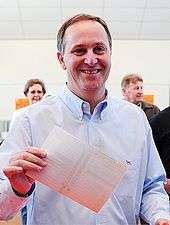
Leader of the Opposition
In his maiden speech as National Party leader on 28 November 2006, Key talked of an "underclass" that had been "allowed to develop" in New Zealand, a theme which received a large amount of media coverage.[23] Key followed up on this speech in February 2007 by committing his party to a programme which would provide food in the poorest schools in New Zealand.[24]
He relented on his stance in opposition to Sue Bradford's Child Discipline Bill, which sought to remove "reasonable force" as a defence for parents charged with prima facie assault of their children. Many parents saw this bill as an attempt to ban smacking outright.[25] Key and Prime Minister Helen Clark agreed a compromise – giving police the discretion to overlook smacking they regarded as "inconsequential".[26]
In August 2007 Key came in for criticism when he changed his position regarding the Therapeutic Products and Medicine Bill:
"John Key had finally slipped up. National's leader had told the Herald on Tuesday he would have signed up to a New Zealand First-initiated compromise on the stalled Therapeutic Products and Medicines Bill had he seen it – and was still willing to sign up – only to change his mind yesterday after his remarks appeared in print".[27]
Also in August 2007, Labour's Trevor Mallard hinted in Parliament that Labour would try to link Key to the 1987 "H-Fee" scandal, which involved Key's former employer Elders Merchant Finance and a payment to Equiticorp Chief Executive Allan Hawkins. Hawkins and Elders executive Ken Jarrett were later jailed for fraud. Key forestalled the accusation by declaring that he had left Elders months before the event, that he had no knowledge of the deal, and that his interview with the Serious Fraud Office (SFO) during the investigation into the affair could only have helped to convict the people involved. Then-SFO director Charles Sturt publicly supported Key's statement.[28][29]
Labour MPs criticised Key for not releasing specific policy information at their annual conference. Key responded that National would set its own policy agenda and that there was adequate time before the next election for voters to digest National Party policy proposals.[30]
Prime Minister
First term
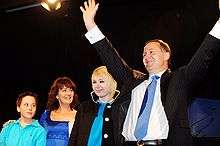
Key became Prime Minister following the general election on 8 November 2008, which signalled an end to the Labour-led government of nine years under Helen Clark. The National Party, promoting a policy of "change", won 45% of the party vote and 59 of the 122 seats in Parliament (including a two-seat overhang), a substantial margin over the Labour Party, which won 43 seats.
Key was sworn in as Prime Minister and Minister of Tourism[31] and also appointed as a member of the Executive Council[32] on 19 November 2008 with his new cabinet.[33] He appointed Bill English as his Deputy Prime Minister and Minister of Finance. During his first term in office National remained high in the polls and one commentator described support for John Key as "stratospheric".[34] In 2011 he was nicknamed "Teflon John" in the popular media, as nothing damaging to his reputation seemed to "stick" to him.[35]
Key's government introduced several bold economic policies in response to the global economic downturn that began shortly after he took office. He announced a plan of personal tax cuts, reducing taxes on all income; the top personal tax rate was lowered from 39% to 38% and then 33%.[36] However, statements made by Key regarding New Zealand's national credit rating have proved controversial. In October 2011 he claimed that Standard & Poor's had said that "if there was a change of Government, that downgrade would be much more likely". S&P contradicted the claim, bringing Key's credibility into question.[37][38] National won the election, but New Zealand's credit rating was subsequently downgraded anyway – by two different agencies – Standard and Poor's and Fitch Group.[39]
In January 2009, after addressing Chinese New Year celebrations at the Greenlane ASB Showgrounds, Key tripped after coming down a small set of stairs in front of cameras leaving him with a broken right arm and "embarrassed".[40] Later that year, when arriving at the Ngapuhi Te Tii Waitangi Marae the day before Waitangi Day, Key was briefly shoved and grabbed by two protesters before diplomatic protection officers pulled them off. He told reporters he was "quite shocked" but continued onto the marae and spoke, while police took the two men away and charged them with assault.[41][42]
Key has been tied with the National Cycleway Project since its conception at the national Job Summit in early 2009. He proposed it, and as Minister for Tourism, was instrumental in getting NZ$50 million approved for initial construction work.[43]
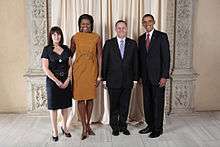
Key launched New Zealand's campaign for a Security Council seat at the UN General Assembly meeting in September 2009.[44] He met briefly with US President Barack Obama and former US President Bill Clinton. While in New York City, Key appeared on the Late Show with David Letterman. He read out the Top Ten list, 'Top Ten Reasons You Should Visit New Zealand'.[45]
In foreign policy, Key has supported closer relations with the United States, an ANZUS defence partner. On 4 November 2010, US Secretary of State Hillary Clinton and New Zealand Foreign Minister Murray McCully signed the Wellington Declaration. The agreement signals an increase in the strategic partnership between the two nations and covers areas of co-operation including nuclear proliferation, climate change and terrorism.[46] This was followed in June 2012 by a companion document, the Washington Declaration.[47] Since 2008 Key has also engaged in Trans-Pacific Partnership negotiations with the United States and other Asia-Pacific economies.[48]
On 22 February 2011 a 6.3 magnitude earthquake struck Christchurch, causing widespread damage to the city region and significantly affecting the national economy. It was New Zealand's third deadliest natural disaster, killing 185 people.[49][50] Addressing the nation, Key said that the disaster "...may well be New Zealand's darkest day".[51][52] On 29 March 2011, Key announced the creation of the Canterbury Earthquake Recovery Authority (CERA) to manage the earthquake recovery, co-operating with the government, local councils and residents.[53]
In October 2011, Key was caught up in a controversy over the replacement of 34 three-year-old Government BMW limousines with new ones at a time of economic restraint. Initially, Key denied any knowledge of the plan, although reports later surfaced showing that his office was aware of the deal. Political opponents accused Key and his government of hypocrisy; he later apologised, calling it a "sloppy" deal, effectively placing most of the blame on his chief of staff.[54][55]
Shortly before the general election in November 2011, a recording was made of a conversation between John Key and ACT Party candidate John Banks that they considered private – though the conversation took place in a public cafe.[56] Key made a complaint to the police and compared the incident to illegal phone hacking in the News of the World scandal in Britain.[57] The recording allegedly concerns the leadership of ACT and disparaging remarks about elderly New Zealand First supporters.[58] Journalists and opposition parties demanded the release of the tapes[57] and the affair was nicknamed 'teapot tape'.[57] A senior barrister criticised Key, stating that the comparison of the recording to the phone hacking scandal was a "cheap shot".[57]
Second term
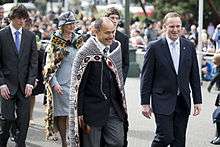
The general election on 26 November 2011 saw National hold on to power,[59] but with a reduced share of the votes and share of the seats in the House of Representatives. Nonetheless, Key called the election a "very happy night" and a "strong and solid win" for his party.[60] The Prime Minister negotiated confidence and supply agreements with the centrist United Future,[61] the classical-liberal ACT Party[61] and the indigenous rights-based Māori Party,[62] to form a minority government.
In May 2012 Key announced a withdrawal of New Zealand troops from Afghanistan by 2013, a year earlier than planned.[63]
In 2012, Key was implicated in the arrest of Kim Dotcom and the subsequent revelations that the Government Communications Security Bureau (GCSB) had illegally spied on Dotcom.[64] As Prime Minister, John Key is directly responsible for the GCSB,[65] which is not allowed to spy on New Zealand citizens – and Dotcom had been granted permanent residency. Three days later, the Prime Minister John Key apologised for the illegal spying. "I apologize to Mr Dotcom. I apologize to New Zealanders because every New Zealander…is entitled to be protected from the law when it comes to the GCSB, and we failed to provide that appropriate protection for him."[66] It subsequently came to light that Deputy Prime Minister Bill English had been asked by the GCSB to sign a "ministerial certificate" suppressing details of the bureau's involvement in the case while Key was overseas – the only time this had been done in the last ten years.[67]
In November 2012, Key told students at St Hilda's Collegiate in Dunedin that professional footballer David Beckham was "thick as batshit". The comments were picked up by UK papers The Daily Mirror and The Sun.[68] On the same day, there was controversy over Key's comments to a radio host that his shirt was "gay". "You're munted mate, you're never gonna make it, you’ve got that gay red top on there", he told host Jamie Mackay on RadioSport's Farming Show.[69] The following day, Lord of the Rings actor Sir Ian McKellen said in a blog entry that Key should "watch his language".[70]
The potential fallout from Dotcom's arrest continued in December 2012 when the High Court ordered the GCSB to "confirm all entities" to which it gave information opening the door for Dotcom to sue for damages – against the spy agency and the police.[71] Later that month, John Key's rating as preferred PM dropped to 39% – the first time in his four years as prime minister that his rating had slipped below 40%.[72]
In March 2013 it emerged that Key has known Ian Fletcher, head of the GCSB, since they were at school, but Key denied the pair were friends; he also denied suggestions that he 'shoulder-tapped' Fletcher for the role.[73] Subsequently, on 3 April, Key's office released a statement saying the Prime Minister rang Fletcher and recommended he apply for the position at GCSB.[73] Despite Key's office claiming Fletcher was "the best candidate for the job", Fletcher was in fact the only candidate interviewed.[74] Key said he hadn't originally mentioned the phone call because he "forgot".[75] Political commentator Bryce Edwards called it the "most appalling political management since he became Prime Minister back in 2008".[76] Key was critical of reporting on the GCSB saga, calling journalists "knuckleheads" in a radio interview.[77]
Key continued New Zealand's push for a spot on the UN Security Council while in New York in 2013.[78][79] There he accused rival candidates Spain and Turkey of using aid money to buy votes from small African countries, and said New Zealand would not be spending its way onto the Council.[80][81] While in New York, Key suddenly fell ill, but recovered in time for meetings with representatives from other countries ahead of the General Assembly.[82]
In April 2013 whilst visiting Chinese president Xi Jinping in Beijing, Key made headlines by suggesting New Zealand would back any United States or Australian military action against North Korea.[83] The following day he backtracked, saying the chance of New Zealand troops entering North Korea was "so far off the planet".[84]
In May 2014 Key justified the use of New Zealand intelligence even if it resulted in innocent civilians falling to American targeted killings.[85]
Third term
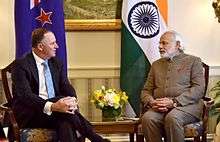
The general election on 20 September 2014 saw the Fifth National Government returned again. National won a plurality with 47.0% of the party vote and 60 of the 121 seats. On election night counts the party appeared to hold the first majority since 1994 with 61 seats, but lost a list seat (for Maureen Pugh) to the Green Party on the official count (including special votes) of the party vote.[86] National re-entered a confidence and supply arrangement with United Future, the ACT Party and the Māori Party.[87][88][89]
On 6 October 2014, Key created a new ministerial portfolio called the Minister of National Security and Intelligence. The Minister of National Security and Intelligence will be responsible for setting national security and intelligence police and legislation, and will also head a newly established Cabinet National Security Committee. The Prime Minister will assume the new portfolio while the Attorney General Christopher Finlayson will assume the portfolios of Minister Responsible for the Government Communications Security Bureau (GCSB) and Minister in Charge of the New Zealand Security Intelligence Service (NZSIS), which have traditionally been held by the Prime Minister.[90][91]
On 21 November 2014, Key was elected Chairman of the International Democrat Union (IDU), an international alliance of centre-right political parties.[92] The National Party was a founding member party in 1983.[93]
In April 2015 a waitress claimed and Key acknowledged that he had pulled her ponytail multiple times over several months;[94] when Key learnt she had taken offence, he apologised. International media have reported the incident as "ponytail-gate".[95]
Key has long supported changing the Flag of New Zealand, and during the 2014 general election campaign promised a referendum on the issue.[96] Following the election win, two New Zealand flag referendums were held in November/December 2015 and March 2016. The second resulted in the retention of the current flag.[97] Critics (both national and international) charged that the referendums were unnecessary, expensive and a "wasteful vanity project".[97]
Key has been a leading advocate of the Trans-Pacific Partnership (TPP), having also supported the Trans-Pacific Strategic Economic Partnership (TPSEP). Both agreements provide for a multilateral free trade area in the Asia-Pacific region. In a September 2016 speech to the Council of Foreign Relations, Key said "[TPP] will boost our economy by at least $2.7 billion a year by 2030. It will help diversify our economy and create more jobs and higher incomes for New Zealanders".[98] The finalised TPP proposal was signed on 4 February 2016 in Auckland, concluding seven years of negotiations. The provisional proposal is currently awaiting ratification to enter into force.[99] Ratification of the TPP agreement by Key, on behalf of New Zealand, will require approval from Parliament.[100]
On 5 December 2016, Key announced his resignation as prime minister and leader of the National Party. His resignation will take effect on 12 December, however he will remain in parliament to avoid a by-election.[2]
Political views
Key's views are largely aligned with his own party's view. However, he also notes that his differences from his predecessor are more of style and focus rather than view.[101] Key has in the past noted others' concern at the pace of asset sales, but argued that the arguments against selling assets in the 1980s were largely irrational.[102] In a 2002 interview he said "some form of orientation towards privatisation" in health, education and superannuation, such as giving firms tax breaks for employer super schemes, made sense.[103] After his party won a plurality in the 2011 election, Key rejected claims that the National Government lacks a mandate to partially privatise state-owned assets.[104]
Key has a mixed voting record on social issues: he voted against the bill creating civil unions,[105] claiming that this represented his constituents' views but he supports them personally.[106] He was part of a large block of MPs voting to defeat a bill that defined marriage as being between a man and a woman.[107] Key has also stated that he does not oppose gay adoption.[108] In 2013 he expressed support for same-sex marriage[109] and voted for the Marriage (Definition of Marriage) Amendment Act 2013.[110]
In 2008 Key voted for an ill-fated attempt to raise the legal drinking age from 18 back to 20[111] but subsequently ignored a Law Commission recommendation to increase levies on alcohol.[112] He claimed there was "no appetite" for such a move.[113] A report on public attitudes to alcohol law reform was later discovered, which indicating that in 2010, when he made this claim, 56% of New Zealanders supported a price increase.[114]
Key says that he believes that global warming is a real phenomenon, and that the Government needs to implement measures to reduce human contribution to global warming.[115] Key has committed the National Party to working towards reducing greenhouse emissions in New Zealand by 50% within the next fifty years.[116] Commentators note that as recently as 2005, Key made statements indicating that he was sceptical of the effects and impact of climate change.[115][117]
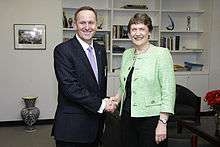
As a first-term MP in 2003, Key criticised the Labour-led Government's stance on the Invasion of Iraq, claiming that New Zealand was "missing in action" by failing to support its ANZUS allies, the United States and Australia.[118] Key came under fire in the New Zealand Parliament in August 2007, when the Government claimed that had Key been Prime Minister at the time, he would have sent troops to Iraq.[119]
Like his predecessor Helen Clark, Key views a New Zealand republic as "inevitable", although probably not for another decade. "If Australia becomes a republic there is no question it will set off quite an intense debate on this side of the Tasman", he said. "We would have to have a referendum if we wanted to move towards it."[120] Key later stated that he is a monarchist, and that a New Zealand republic would "Not [happen] under my watch".[121]
Religious views
Key attends church frequently with his children, but is an agnostic.[122][123] He has stated that he does not believe in an afterlife, and sees religion as "doing the right thing".[122] Key's wife, Bronagh (née Dougan) Key, is the daughter of Northern Irish emigrants of mixed religious descent.[124]
See also
References
- 1 2 "Official Count Results–Helensville". New Zealand Electoral Commission. 12 November 2008. Retrieved 12 November 2008.
- 1 2 "New Zealand Prime Minister John Key announces resignation". Stuff.co.nz. 5 December 2016. Retrieved 5 December 2016.
- 1 2 "John Key's Family Tree" (PDF). New Zealand Herald. Retrieved 17 August 2014.
- ↑ "Long-lost half-brothers Key has never met". The New Zealand Herald. Jul 19, 2008. ISSN 1170-0777. Retrieved 2015-06-18.
- 1 2 3 4 "POLITICS: John Key – A snapshot". Sunday Star Times. 3 February 2008. Archived from the original on 19 March 2008. Retrieved 21 June 2015.
- 1 2 3 4 Rapson, Bevan (26 April 2005). "Golden Boy". Metro Magazine. Archived from the original on 28 February 2008. Retrieved 28 February 2008.
- ↑ "New Zealand gets third Jewish prime minister". The Jerusalem Post. 9 November 2008. Retrieved 13 June 2010.
- ↑ O’Connor, Paul (2009). Choosing the Right Path: Burnside High School 1960–2010. Christchurch: Silver Fox Publishing. pp. 198–199. ISBN 978-0-473-15685-5.
- ↑ "Christchurch's Aorangi School to close". Television New Zealand. 24 November 2009. Retrieved 8 March 2010.
- ↑ Tait, Maggie (27 November 2006). "Profile: John Key". The New Zealand Herald. Retrieved 28 February 2008.
- ↑ "Radio station warns staff about Max Key". New Zealand Herald. 2016-02-10. ISSN 1170-0777. Retrieved 2016-02-11.
- ↑ NBR Staff (25 July 2008). "Rich List 2008: A bad economy, but the rich still get richer". National Business Review. Retrieved 1 November 2008.
- ↑ Berry, Ruth (25 November 2006). "Will the real John Key step forward". The New Zealand Herald. Retrieved 13 June 2010.
- ↑ McIntyre, Donna (12 January 2008). "My Job: John Key, Leader of the National Party". The New Zealand Herald. Retrieved 13 June 2010.
- ↑ "Big Dealers". Close Up. NZ On Screen. 10 September 1987. Retrieved 18 November 2011.
- 1 2 Tett, Gillian; Laugesen, Ruth (3 February 2008). "Who is John Key?". Sunday Star Times. Archived from the original on 19 March 2008. Retrieved 28 February 2008.
- ↑ "New Zealand Parliament – Key, John". Retrieved 28 February 2008.
- ↑ Bingham, Eugene (26 July 2008). "Ambush in the West". The New Zealand Herald. Retrieved 13 November 2010.
- ↑ "Electorate Profile Helensville" (PDF). Parliamentary Library. October 2005. Retrieved 26 May 2010.
- ↑ "Official Count Results–Helensville". New Zealand Electoral Commission. 10 August 2002. Retrieved 13 June 2010.
- ↑ "Official Count Results–Helensville". New Zealand Electoral Commission. 1 November 2005. Retrieved 23 August 2007.
- ↑ New Zealand Press Association; The New Zealand Herald Staff (23 November 2006). "Don Brash gone at lunchtime". The New Zealand Herald. Retrieved 26 August 2007.
- ↑ Key, John (28 November 2006). "Speech to North Shore National Party luncheon". New Zealand National Party. Retrieved 23 August 2007.
- ↑ Key, John (4 February 2007). "National launches its Food in Schools programme" (Press release). New Zealand Government. Retrieved 23 August 2007.
- ↑ Compare: "78pc of parents say they'll still smack". The New Zealand Herald. 18 June 2007. Retrieved 23 August 2007.
82 per cent thought [the new law] should be changed to state that parents who smacked their children to correct them were not breaking the law.
- ↑ Colwill, Jennifer (2 May 2007). "The smacking bill – what it says". The New Zealand Herald. Retrieved 22 May 2007.
- ↑ Armstrong, John (2 August 2007). "John Armstrong: At last, Labour gets to give Key a good kicking". The New Zealand Herald. Retrieved 23 August 2007.
- ↑ Trevett, Clare (25 August 2007). "Former SFO chief backs Key's claims". The New Zealand Herald. Retrieved 26 February 2008.
- ↑ Long, Richard (28 August 2007). "Muck-rakers desperate for dirt". The Dominion Post. Stuff.co.nz. Archived from the original on 19 March 2008. Retrieved 13 June 2010.
- ↑ Oliver, Paula (3 August 2007). "John Key's policy: There'll be more, later". The New Zealand Herald. Retrieved 23 August 2007.
- ↑ "Appointment of Ministers" (21 November 2008) 179 New Zealand Gazette 4634.
- ↑ "Members of Executive Council Appointed" (21 November 2008) 179 New Zealand Gazette 4634.
- ↑ Fleming, Grant (16 November 2008). "John Key announces he has numbers to govern". The New Zealand Herald. Retrieved 17 November 2008.
- ↑ "Key could do with element of doubt". The New Zealand Herald. Retrieved 20 September 2014.
- ↑ Chapman, Paul (26 November 2011). "John Key, the 'smiling assassin' on course to win New Zealand's election". The Telegraph. Retrieved 6 September 2013.
- ↑ Trevett, Claire (19 March 2009). "Spend tax cut or give it to the needy: PM". The New Zealand Herald. Retrieved 25 January 2010.
- ↑ Young, Audrey (10 October 2011). "S&P contradicts Key downgrade claim". The New Zealand Herald.
- ↑ Armstrong, John (11 October 2011). "Key's credibility takes a hit". The New Zealand Herald.
- ↑ "Key can't rule out Moody's downgrade". The New Zealand Herald. Retrieved 20 September 2014.
- ↑ Trevett, Claire (19 January 2009). "John Key says arm break 'very embarrassing'". The New Zealand Herald. Retrieved 12 September 2011.
- ↑ "Protesters attack New Zealand PM". BBC News. 5 February 2009. Retrieved 5 February 2009.
- ↑ "Protester grabs NZ leader at indigenous ceremony". Associated Press. CBS News. 5 February 2009. Archived from the original on 13 June 2010. Retrieved 13 June 2010.
- ↑ Daniels, Chris (14 May 2009). "Cycleway gets $50m – now a series of 'Great Rides' says Key". The New Zealand Herald. Retrieved 7 October 2011.
- ↑ Tait, Maggie (26 September 2009). "NZ to seek Security Council seat, Key tells UN". The New Zealand Herald. Retrieved 13 June 2010.
- ↑ ONE News; New Zealand Press Association (25 September 2009). "John Key on David Letterman". Television New Zealand. Retrieved 13 June 2010.
- ↑ "Full text of the Wellington Declaration". Stuff.co.nz. NZPA. 4 November 2010. Retrieved 30 October 2011.
- ↑ "US-NZ defence arrangement signed". The Beehive. 20 June 2012. Retrieved 11 November 2016.
- ↑ "TPP has momentum says Prime Minister". The Beehive. 14 November 2010. Retrieved 11 November 2016.
- ↑ "Official quake toll rises to 185". Stuff.co. 9 February 2012. Retrieved 9 February 2012.
- ↑ "List of deceased – Christchurch earthquake". New Zealand Police. 8 September 2011. Retrieved 26 December 2011.
- ↑ Manhire, Toby (22 February 2011). "Christchurch earthquake: at least 65 dead and 100 trapped in 'darkest day'". The Guardian. Retrieved 29 August 2016.
- ↑ "New Zealand faces its 'darkest day' after 6.3 quake". BBC News. 22 February 2011. Retrieved 29 August 2016.
- ↑ Donnell, Hayden (29 March 2011). "Christchurch will be 'world's most quake-safe city'". New Zealand Herald. APN Holdings. Retrieved 29 March 2011.
- ↑ "Limo deal sloppy: Key". Otago Daily Times. NZPA. 21 February 2011. Retrieved 7 October 2011.
- ↑ Armstrong, John (22 February 2011). "Mea culpa a bid to save brand". The New Zealand Herald. Retrieved 7 October 2011.
- ↑ Cheng, Derek (23 November 2011). "Tea tape: Police execute warrants". The New Zealand Herald.
- 1 2 3 4 "Key's News of the World 'cheap shot'". The New Zealand Herald. Retrieved 20 September 2014.
- ↑ Armstrong, John (16 November 2011). "'Teapot tape' could nail lid to Act coffin". The New Zealand Herald.
- ↑ "National defies the pundits". The New Zealand Herald. Retrieved 20 September 2014.
- ↑ "Key to hold confidence and supply talks". Stuff.co.nz. 27 November 2011. Retrieved 29 August 2016.
- 1 2 "Key signs deals with United Future and ACT". Radio New Zealand. 5 December 2011. Retrieved 30 August 2016.
- ↑ "Nats and Maori Party sign". The New Zealand Herald. 11 December 2011. Retrieved 30 August 2016.
- ↑ Hartevelt, John (22 May 2012). "NZ to withdraw early from Afghanistan". Stuff.co.nz. Retrieved 29 September 2016.
- ↑ Vance, Andrea (29 August 2013). "GCSB acted illegally on Kim Dotcom". Stuff.co.nz. Retrieved 29 August 2016.
- ↑ "Dotcom: Illegal spying revealed". The New Zealand Herald. Retrieved 20 September 2014.
- ↑ "New Zealand Prime Minister John Key Apologizes To Kim Dotcom, Says Spying Was Illegal". 27 September 2012. Retrieved 27 September 2012.
- ↑ Fisher, David (Dec 4, 2012). "Spy agency's secrecy order one-in-10-year case". The New Zealand Herald. ISSN 1170-0777. Retrieved 2015-06-18.
- ↑ "John Key plagued by 'thick' comment about David Beckham". 3 News NZ. 3 November 2012.
- ↑ "PM to radio host: 'You've got that gay red top on'". 3 News. 5 November 2012.
- ↑ "Sir Ian McKellen tells Key to 'watch his language'". 3 News NZ. 6 November 2012.
- ↑ "Dotcom can pursue case against police". The New Zealand Herald. Retrieved 20 September 2014.
- ↑ Small, Vernon; Daly, Michael (Dec 3, 2012). "Polls have Labour closing in on Nats". Stuff.co.nz. Retrieved 2015-06-18.
- 1 2 "Key admits Fletcher shoulder-tap". 3 News NZ. 3 April 2013.
- ↑ "Cronyism in spy job appointment – Labour". 3 News NZ. 3 April 2013.
- ↑ "Key's faulty memory on GCSB an 'excuse'". 3 News NZ. 4 April 2013.
- ↑ "John Key: The honeymoon 'is over'". 3 News NZ. 8 April 2013.
- ↑ "Key changes tack with media". 3 News NZ. 8 April 2013.
- ↑ Patrick Gower. "Key lobbying for NZ at UN General Assembly". Retrieved 20 September 2014.
- ↑ "NZ UN seat campaign run 'on a shoe string'". The New Zealand Herald. Retrieved 20 September 2014.
- ↑ Patrick Gower. "UN Security Council 'bribery' just plain wrong". Retrieved 20 September 2014.
- ↑ "Key in 'honest broker' pitch to UN". Stuff. Retrieved 20 September 2014.
- ↑ Patrick Gower. "John Key sick before spying talks". Retrieved 20 September 2014.
- ↑ "Key in China heeds NKorea threats". 3 News NZ. 7 April 2013.
- ↑ "Key backs off South Korea war remarks". 3 News NZ. 8 April 2013.
- ↑ "Drone strikes justified – Key". Stuff.co.nz. May 20, 2014. Retrieved 2015-06-18.
- ↑ Rutherford, Hamish (4 October 2014). "National loses majority, Greens pick up one". Fairfax NZ News. Retrieved 4 October 2014.
- ↑ Davison, Issac (29 September 2014). "Dunne deal: United Future signs agreement with National-led govt". The New Zealand Herald. Retrieved 29 September 2014.
- ↑ Bennett, Adam (5 October 2014). "National signs deal with Maori Party". The New Zealand Herald. Retrieved 5 October 2014.
- ↑ Davison, Issac (29 September 2014). "Act deal: No portfolio for David Seymour". The New Zealand Herald. Retrieved 29 September 2014.
- ↑ "National Security and Intelligence role created". Scoop Media. New Zealand. 6 October 2014. Retrieved 7 October 2014.
- ↑ "Outline of security portfolio responsibilities" (PDF). Scoop Media. 6 October 2014. Retrieved 7 October 2014.
- ↑ "The Right Honourable John Key MP". International Democrat Union. Retrieved 29 August 2016.
- ↑ "Key elected chair of conservative union". Radio New Zealand. 21 November 2014. Retrieved 29 August 2016.
- ↑ Associated Press (April 21, 2015). "New Zealand Prime Minister Apologizes for Ponytail Pulling". New York Times. Retrieved August 5, 2015.
- ↑ "Ponytail-pulling PM makes world headlines". Stuff.co.nz. 23 April 2015. Retrieved 2015-06-18.
- ↑ "Kiwis could vote on flag next year". Stuff.co.nz. Sep 22, 2014. Retrieved 2015-06-18.
- 1 2 "'Wasteful vanity project' and 'starry-eyed sheep' - How world reacted to flag result". New Zealand Herald. Retrieved 25 October 2016.
- ↑ "PM reinforces TPP benefits in New York". The Beehive. 20 September 2016. Retrieved 11 November 2016.
- ↑ "How TPP Countries Will Ratify the Trans-Pacific Partnership". ecat. 10 March 2016. Retrieved 11 November 2016.
- ↑ "Govt has numbers to ratify TPP". Radio New Zealand. 29 January 2016. Retrieved 11 November 2016.
- ↑ "Agenda Interview with Lisa Owen". Agenda. 2007. Retrieved 22 February 2007.
- ↑ Key, John (4 March 2005). "Lifting the performance of the state sector under a future National Government". New Zealand National Party. Retrieved 22 February 2009.
- ↑ Gamble, Warren (23 March 2002). "National's bright young hope". Newspaper. The New Zealand Herald. Retrieved 13 June 2010.
- ↑ Young, Audrey (28 November 2011). "Asset sales: we have a mandate – Key". The New Zealand Herald.
- ↑ Newstalk ZB; The New Zealand Herald Staff (2 December 2004). "MPs vote 65–55 in favour of Civil Union Bill". Retrieved 27 February 2008.
- ↑ Else, Anne (31 October 2008). "What I heard John Key say". Scoop. Retrieved 5 June 2010.
- ↑ "'I'm more liberal than I look'". The New Zealand Herald. 26 July 2008. Retrieved 13 June 2010.
- ↑ "Key fronts up with news for Brad". The New Zealand Herald. 24 October 2008. Retrieved 13 June 2010.
- ↑ Shuttleworth, Kate. "Gay marriage gets PM's full support". The New Zealand Herald. Retrieved 29 August 2016.
- ↑ Ball, Andy; Singh, Harkanwal (April 17, 2013). "Marriage equality bill – How MPs voted". Stuff.co.nz. Retrieved 2015-06-18.
- ↑ Houlahan, Mike (9 November 2006). "Drinking age stays at 18, review announced". The New Zealand Herald. Retrieved 26 February 2008.
- ↑ "Review of Regulatory Framework for the Sale and Supply of Liquor". Retrieved 20 September 2014.
- ↑ "Editorial: Failure of nerve on liquor law". The New Zealand Herald. 2 May 2010.
- ↑ "Dunne in gun over survey backing booze crackdown". Stuff. Retrieved 20 September 2014.
- 1 2 List, Kevin (29 November 2006). "2005 Vs 2006: Key And Climate Change". Scoop. Retrieved 13 June 2010.
- ↑ Key, John (2 July 2009). Federated Farmers National Conference (Speech). Retrieved 13 June 2010.
- ↑ "FULL COVERAGE: John Key ChChChanges On Climate". Scoop. 30 November 2006. Retrieved 22 December 2008.
- ↑ Sachdeva, Sam. "John Key stands by support for Iraq war in 2003, in wake of damning UK report". stuff.co.nz / Fairfax Media. Retrieved 2 September 2016.
- ↑ McCarten, Matt (26 August 2007). "All you wanted to know about John Key but were afraid to ask". The New Zealand Herald. Retrieved 29 August 2007.
- ↑ Barrowclough, Anne (10 November 2008). "John Key: victory for New Zealand's multimillionaire political novice". London: The Times. Retrieved 11 December 2008.
- ↑ Hartevelt, John (May 10, 2011). "NZ steers future of Royal succession". Stuff.co.nz. Retrieved 2015-06-18.
- 1 2 Berry, Ruth (25 November 2006). "Will the real John Key step forward". The New Zealand Herald. Retrieved 23 August 2007.
if you're asking me if I'm religious it depends how you define religion. I look at religion as doing the right thing....I go to church a lot with the kids, but I wouldn't describe it as something that I ... I'm not a heavy believer; my mother was Jewish which technically makes me Jewish. Yeah, I probably see it in a slightly more relaxed way.
- ↑ NZPA (5 November 2008). "Clark and Key spar in final TV debate before election". Retrieved 15 June 2010.
- ↑ "John and Bronagh Key: "A strong bond of trust"". The Sunday Star-Times. 26 October 2008. Archived from the original on 4 December 2008. Retrieved 13 June 2010.
Further reading
- Levine, Stephen and Nigel S. Roberts, eds. Key to Victory: The New Zealand General Election of 2008 (Victoria U.P, 2010)
External links
| Wikimedia Commons has media related to John Key. |
| Wikinews has related news: Exclusive interview with New Zealand politician, John Key |
- Official website
- Prime Minister of New Zealand official website
- Profile at New Zealand National Party website
- Profile at Parliament of New Zealand website
- Releases and speeches at Beehive website
- The New Zealand Herald feature: John Key–the unauthorised biography
| New Zealand Parliament | ||
|---|---|---|
| New constituency | Member of Parliament for Helensville 2002–present |
Incumbent |
| Political offices | ||
| Preceded by Don Brash |
Leader of the Opposition 2006–2008 |
Succeeded by Phil Goff |
| Preceded by Helen Clark |
Prime Minister of New Zealand 2008–present |
Incumbent |
| Preceded by Damien O'Connor |
Minister of Tourism 2008–present | |
| Party political offices | ||
| Preceded by Don Brash |
Leader of the National Party 2006–present |
Incumbent |
| Preceded by John Howard |
Chair of the International Democrat Union 2014–present | |